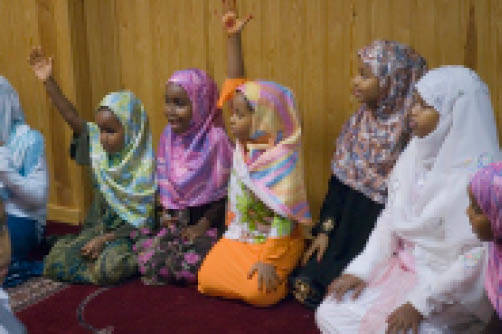
Alhamdulillah, by the special grace of Almighty Allah, we have come to the end of the holy month of Ramadan. We sincerely hope and pray that our acts of worship, in the blessed month, have found acceptance with Allah SWT.
As is his custom to speak on issues of the moment, my esteemed brother, Imam Murtadha Gusau, has dedicated his Friday sermon to the ideal ways to celebrate Eid. Below are excerpts from the sermon, to serve as a reminder for the rest of us. Have a great Eid celebration. Barka da Sallah.
The Islamic Way Of Celebrating Eid By Imam Murtadha Gusau
Bismillahir Rahmanir Rahim
All praises are due to Almighty Allah, the Lord of the Worlds
Ibnul Arabi says:
“It is called Eid because it returns every year with renewed happiness. Some scholars say it is derived from ‘adah’ (custom or practice) because people are accustomed to celebrating it.
Ibn Abidin said:
“The Eid days are thus named because Almighty Allah renews His Bounties in them; and He distributes His blessings to His servants. From these are Fitr (eating), after food had been prohibited and Sadaqatul Fitr (the charity of breaking the fast) to the needy. And on Eid-ul-Adha, the completion of Hajj with the final Tawaf of visiting; the meat from sacrifices and many other acts. Also because the custom in Eid is joy, happiness, cheerfulness and gladness.” [See Hashiyah of Ibn Abidin, vol. 2 page 165]
– Recommended Acts on Eid:
Eid is a purely religious occasion, since it is granted by Allah through the revelation and when Allah grants something, he grants it complete and perfect. Thus, He granted us Eid and instructions to celebrate it.
1. Ghusl (Bathing):
It is recommended to take bath on the morning of Eid. Nafi’ reports:
“Abdullah bin Umar (RA) used to bathe on the day of Fitr before setting out to the Musallah (Eid Praying Ground).” [Sahih, Reported by Malik and Shafi’i]
2. Adornment And Beautifying Oneself For Eid:
Ibn Umar (RA) said:
“Umar (RA) bought a silk outer-garment that was being sold in the market. He came to the Messenger of Allah (Peace be upon him) and said: “Take this garment, to adorn (yourself) with on Eid and for meeting delegations with. Allah’s Messenger (Peace be upon him) replied: “Indeed, this is the garment of the one who has no share of the Hereafter.” Umar remained as long as Allah willed him to remain and then left. Then, the Messenger of Allah (Peace be upon him) sent to him the silk garment. So Umar came with it to the Messenger of Allah (Peace be upon him) and said: “O Messenger of Allah! You said indeed this is the garment of the one who has no share of the Hereafter but you sent this garment to me!” So the Messenger of Allah said: “Sell it and fulfill your needs with its profit.” [Sahih Al-Bukhari and Sahih Muslim and others]
Imam Hafiz Ibn Hajar (Rahimahullah) said:
“The evidence derived from this Hadith is that the Messenger of Allah (Peace be upon him) approved Umar on the basic principle of beautifying oneself for Eid and restricted him to wear garment made of silk.” [See Fat-hul-Bari vol. 2 page 234]
From beautifying oneself on Eid is wearing Kohl (Kwalli), perfumes and oil, wearing turban, caps etc. It is also recommended to wear best clothes on Eid.
3. Eating some dates on the morning of Eid:
Narrated Anas Ibn Malik (RA):
“The Messenger of Allah (Peace be upon him) would not leave (his house) on the day of Fitr until he ate some dates.” [Sahih Al-Bukhari and others]
Imam Al-Muhallab said:
“The wisdom in eating before the prayer is to avoid the assumption that one must continue to fast until the Eid prayer is over.” [See Fat-hul Bari, vol. 2, page 447]
4. Proceeding to the Musallah (Eid Praying Ground):
The Sunnah is to hold the Eid prayer in the open. The outdoor place is known as the Musallah. Abu Sa’id Al-Khudri (RA) said:
“The Prophet (Peace be upon him) on the day of Eid-ul-Fitr and Eid-ul-Adha would go to the Musallah and the first thing that he would begin with is the prayer.” [Sahih Al-Bukhari, Sahih Muslim and an-Nasa’i]
The renowned Islamic scholar Ibn Hajj Al-Maliki said:
“The Sunnah with regards to the Eid Prayer is to perform it at the Musallah. This is because the Messenger of Allah (Peace be upon him) said: “Prayer in my Masjid is a thousand times better than a Prayer anywhere else except the Masjid al-Haram.” [Sahih Al-Bukhari and Sahih Muslim]
Despite this great excellence in his Masjid, he (Peace be upon him) went out (to the Musallah) and left his Masjid.” [See Al-Madhkal vol. 2, page 283]
He, who is unable to proceed to the Musallah, due to illness or old age or due to the rain, can pray in the Mosque and there is no blame on him, In Shaa Allah. [Refer to Al-Mughni, vol. 2, page 230]
5. Going to and returning from the Musallah:
Jabir Ibn Abdullah (RA) said:
“When it was the day of Eid, the Prophet (Peace be upon him) would alter his routes (of returning).” [Sahih Al-Bukhari]
Imam Ibn Al-Qayyim Al-Jawziyyah said:
“The Prophet (Peace be upon him) used to change his route on the days of Eid, such that he went by one route and returned by another. It is said (he did this) to give salams upon the people of both routes. Or so that both groups get some of his blessings. Or so that anybody who has a need can take care of it. Or to make manifest the ruling of Islam… and this is the most correct opinion for all these reasons and for other reasons of wisdom which his actions contain.” [See Zad Al-Ma’ad Fi Hadyi Khairil Ibaad, vol. 1, page 449]
Imam An-Nawawi after mentioning the previous sayings writes:
“Even if the reason is not known, it is still definitely preferred to make it a ruling guideline to be followed and Allah knows best.” [See Rawdatul Talibin, vol. 2, page 77]
6. The goal of offering the prayer in the Musallah is to gather the majority of Muslims in one place. However, we see that people in many countries today have established many Musallahs, even without the need for them, in order to disunite the Ummah. The Islamic scholars and Muslim leaders have warned people against such a thing. [See Nihayatul Muhtaj, by Imam Ar-Ramli, vol. 2, page 375]
And wallahi these numerous Musallahs have turned into podiums set up to declare loyalty to different political parties and divide the word of Muslims. Indeed, there is no Might or Power except with Allah!
7. Going To The Eid Early:
Imam Al-Baghawi said in Sharhus Sunnah, vol. 4, page 302 – 303:
“It is preferred that the people leave for the Musallah after praying the dawn prayer (Fajr), so that they can take their places and make Takbir. While the Imam proceeds when it is time for the prayer.”
8. Walking to the Musallah:
It is recommended to walk to the Musallah, if it is at a short distance. Ali Ibn Abi Talib (RA) said:
“From the Sunnah is to proceed to the Eid (Musallah) by foot.” [At-Tirmidhi]
9. Making Takbir:
Allah the Almighty says:
“… You must exclaim Allah’s greatness for having guided you, so that you may be grateful.” [Quran, 2:185]
Takbir is a distinctive feature of Muslim Eid celebration. It starts from the time one leaves his house heading towards the Musallah. It is established that the Messenger of Allah (Peace be upon him) would emerge on the day of Eid-ul-Fitr and say the Takbir until he reached the Musallah and until he had performed the prayer. So, when he had performed the prayer, he stopped saying the Takbir. [See Silsilah Ahadith As-Sahihah by Shaikh Al Albani]
Shaikh Al Albani (Rahimahullah) said:
“This Hadith contains evidence concerning legality of the common practice of Muslim of saying the Takbir aloud on route to Musallah. Even though many people are now neglecting this Sunnah so much so that it is almost totally forgotten! It would be useful at this point to remind that saying the Takbir in unison (in groups), is not permissible. This applies as well to any other form of Zikr (Remembrance of Allah), whether it is supposed to be said loudly or secretly. Let this be a warning for us, and let us keep in our minds that the best guidance is of Prophet Muhammad (Peace be upon him).” [See As Sahihah, vol. 1, page 121]
– The wisdom in Takbir:
Muslims are instructed to proclaim the Takbir frequently, especially in situations, which might imply feelings of arrogance in the heart. For example; when a person slaughters an animal, he may feel arrogant because he has the power to kill, but when he says: ‘Allah is the Greatest’, he remembers his true position, and that no matter how great and mighty he thinks himself, Allah is Greater and Mightier, and He is the One Who provided him with the animal and gave him the strength to slaughter it. Similarly, throwing stones in Mina is an act of power and aggression. But when the pilgrims say: ‘Allahu Akbar’, they remembers Allah’s Power and Might.
In their travels, the Prophet (Peace be upon him) and his Companions used to say, ‘Allahu Akbar’ when they ascended a hill. Rising to a high place is another act that may cause arrogance in the heart. By applying this Sunnah, one controls himself and remembers that Allah is Greater and Higher.
Likewise, celebrations are occasions of rejoice and happiness. People tend then to be arrogant. But when they remember Allah’s greatness so very frequently, they retain their position of submission and servitude before Him.
Furthermore, saying the Takbir loudly and frequently makes people remember that the Eid is a gift granted by Allah, He is greater than worries and fears, which could mar the Eid spirit; He is the One who guides them, and who is capable of protecting them, removing their worries, and accepting their acts of worship that precedes the Eid.
– The Words of Takbir:
No authentic saying (Hadith) of Allah’s Messenger (Peace be upon him) is found describing the exact words of the Takbir. However, the following have been reported from the Sahabah (Companions RA):
1. Ibn Mas’ud (RA):
“Allahu Akbar, Allahu Akbar, La ilaha illallah, Allahu Akbar, Allahu Akbar wa lillahil-Hamd.” [Sahih, Irwa al-Ghalil no. 650, Daraqutni and Ibn Abi Shaibah]
Meaning: “Allah is the Greatest, Allah is the Greatest, There is none worthy of worship except Allah. Allah is the Greatest, Allah is the Greatest and to Allah belongs all praises.”
2. Ibn Abbas (RA):
“Allahu Akbar, Allahu Akbar, Allahu Akbar wa lillahil-Hamd; Allahu Akbar wa ajal, Allahu akbar ala ma hadana.” [Sahih, Baihaqi]
Meaning:
“Allah is the Greatest, Allah is the Greatest, Allah is the Greatest and to Allah belongs all praises. Allah is the Greatest to that which He has guided us to.”
3. Salman (RA):
“Allahu Akbar, Allahu Akbar, Allahu Akbar kabira.” [Sahih, Baihaqi]
Meaning:
“Allah is the Greatest, Allah is the Greatest, Allah is the Greatest.”
Many people have differed from the pious predecessors (Salaf) in this Zikr, adding innovations and pronouncing the Takbir in unison which have no basis.
Imam Ibn Hajar (Rahimahullah) said:
“Some additions to the Takbir have been innovated in these times for which there is no basis.”
– Eid Greetings:
It is permissible for Muslims to greet each other on the day of Eid with specific greetings, which have been reported from the Sahabah (RA). Responding to a question in this regard, Imam Ibn Taimiyyah (Rahimahullah) said:
“As for the greetings on the day of Eid, then it is by saying to one another when meeting after the prayer: “‘Taqabbalallahu minna wa minkum wa Ahalallahu ‘alaika’ [See Majmu al-Fatawa, vol. 24, page 253]
Meaning:
“May Allah accept it from you and us and may Allah make it return to you, and other things of this nature.”
Imam Hafiz Ibn Hajar said:
“We have related in ‘Mahamiliyat’ with a chain of narration, which is hasan, from Jubair bin Nufair, who said: “The Companions of Allah’s Messenger (Peace be upon him) when they met on the day of Eid, would say to each other: ‘Taqabbalallahu minna wa minkum’ “May Allah accept it from you and us.” [See Fat-hul-Bari, vol. 2, page 446]
This is the greeting with which the Sahabah (RA) used to greet each other with. Therefore, greeting one another in this manner is a part of the religion and thus one will be rewarded for it by Allah.
– Rulings Concerning The Two Eids:
Imam Ibn Taimiyyah said that it is mandatory for every Muslim to attend Eid prayer. Imam Al-Shafi’i said that Eid prayer is mandatory on whomever Jumu’ah prayer is mandatory. Indeed, the Companions narrated that:
“The Prophet (Peace be upon him) ordered them to go out to the Musallah (Eid Praying Ground) when the Eid day starts.” [Related by Al-Tahawi, Al-Baihaqi, and others]
– There Is No Adhan, Nor Iqamah, Nor Saying “Al-Salatu Jami’ah” Before Eid:
Jabir Ibn Samurah (RA) said:
“I prayed (Eid Prayers) with the Prophet (Peace be upon him) more than once without there being Adhan or Iqamah.” [Related by Muslim]
– The Time Of The Prayer:
Imam Ibn Qudamah said:
“It is Sunnah to pray early on Eid-ul-Adha to allow some time for the Sacrifice, and to pray late on Eid-ul-Fitr to have time to give Zakatul-Fitr. To my knowledge, there is no disagreement among scholars on this issue.”
– Eid Prayers Is Not Preceded Or Followed By Sunnah/Nafilah Prayer:
There is no Sunnah (desirable) Prayer before or after Eid Prayer. Ibn Abbas (RA) said:
“On the day of Eid-ul-Fitr, the Prophet (Peace be upon him) went out and offered a two Raka’at Prayer and did not offer any other Prayer before or after it….” [Related by Al-Bukhari and others]
– Women And Children Are Allowed To Attend The Eid Prayer:
Ummu Atiyyah (RA) said:
“Our Prophet (Peace be upon him) ordered us to come out (on Eid day) with mature girls and the young girl’s to attend the gathering of the Muslims but the menstruating women (even though they came out) had to keep away from the Musallah.” [Related by Al-Bukhari and Muslim].
The Imam can be reached via: [email protected] or +2348038289761.

 Join Daily Trust WhatsApp Community For Quick Access To News and Happenings Around You.
Join Daily Trust WhatsApp Community For Quick Access To News and Happenings Around You.


